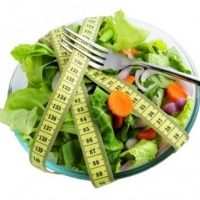Pepper Promotes Weight loss
Like other plants, pepper contains various antioxidants, including luteolin, quercetin and capsaicin. The first two have, according to some studies, protective effects against some chronic diseases. For its part, capsaicin and its derivatives are not only responsible for the sensation of spice pepper characteristic, but also possibly a stimulating effect on energy expenditure.
To Extinguish the Fire
The parties most concentrated capsaicin are, in order of importance, the white membranes, seeds and flesh. Or cooking, or drying or freezing does get around to destroy it. Skeptics need only try: burning sensation is a reflection of its unequivocal presence!
Note that capsaicin is soluble in fats and is neutralized with casein, a milk protein. Also, to calm mouths on fire, it is not water that must swallow, but dairy products such as milk, cheese or yogurt.
Small Boost to Energy Expenditure
Several studies have shown that, in animals and humans, pepper and capsaicin isolated increase energy expenditure. It is difficult to determine how long after ingestion them into action. In one study, energy expenditure is not set to rise 40 minutes after ingestion of chilly, while in another, it increased during the first 30 minutes, then returned to normal thereafter. In several studies, but not all, it indicates that the extra calories burned come from fat especially. Increased secretion of adrenaline and noradrenalin caused by capsaicin could be causing this stimulating effect.
Eating Spicy, Eat Less
People who eat chili to increase appetite during the hot and humid summer days. However, the literature reveals rather the opposite effect. Indeed, during a meal accompanied or preceded pepper (whole or capsule), eat less, thereby reducing caloric intake.
A Pinch or a Teaspoon?
According to studies, the doses used vary widely, from a quarter of fresh chili day, amount of "edible", three quarters per meal! In addition, as the spice is used sometimes fresh, sometimes in the form of powder, it is more difficult to determine an effective dose. That said, if one believes the majority of studies, it appears that buds hardened and endurance are required!
Weight Loss Mystery
In sum, the data currently available suggest that the spice increases energy expenditure and fat oxidation, and decreases calorie intake. While it is true that in theory these effects promote weight loss. However, no study has examined whether the chilly contributed indeed to reduce the number that appears on the scales. A team of researchers, however, examined whether capsaicin taking capsule could help maintain weight loss. After a three-month period, the results indicate no significant difference between those who took capsaicin and the control group.
Seasoning Slimming?
Difficult to say for the moment that the fact of his dishes with seasoning pepper promotes weight loss. Indeed missing pieces to the puzzle. First, because no studies indicating whether or not the spice and / or capsaicin are real allies in the weight loss and also because most of the available studies that have affected small samples and were conducted over a short period.
In general, they had fewer than 25 subjects and evaluated the effects after a single dose, repeated after taking in the course of a day or two weeks after ingestion of a capsule of capsaicin. The only study available is larger than that mentioned above was the effect of capsaicin on weight regain: it included 91 subjects and was conducted over a period of three months. Remember no significant effect was associated with the use of capsaicin. We must therefore expect that new studies be conducted before concluding a real effect of chilly on weight. However, even if the future should we book affirmative results, one question remains: Are you found enough chili to put on the menu every day?
Health Seasoning, Certainly
In addition to providing an exotic and original dishes, chili, low in sodium, is a healthy alternative to salt. You probably already in use for chili and spaghetti sauce, think of it as when cooking stir-fries, curries, soups or risottos Asian. And these are just a few possibilities.
Related Articles
-
Healthy Body Fat Loss: How to Do It
Millions of people around the world right now are struggling to lose u
-
Fbf Blowtorch Training
Can you believe someone who is neither a trainer nor a nutrition exper
-
A Pleasuarble Dieting And Weightloss Experience
Tired of the same old dos and dont when it comes to dieting and weight
-
Weight Loss Efficiency - 10 Ways To Make The Most Out Of Your Gym Workout!
My name is Greg Ryan. I am a high profile fitness ex
-
Drink Tea to Lose Weight
Weight gain has become serious health problem now a day. Ev
-
Eliminating Cellulite With Diet, Exercise and Diligence
Do you hate the thought of having to have plastic surgery for somethin
- DON'T MISS
- Fat Burning Furnace - Rapid Weight Loss Secrets That Can Transform Your Metabolism Overnight!
- Simple Weight Loss Plan
- Weight Loss and Weight Management Information
- Tummy Tuck and Rhinoplasty Enhancing your Look
- Garcinia Cambogia To Lose Weight Quickly
- Reasons Why You Should Lose Weight
- Information on Diet Pills
- Week 11: Tri time
- Diabetics Have a Choice in Weight Loss Programs
- The Biggest Misconception About Weight Loss Programs




